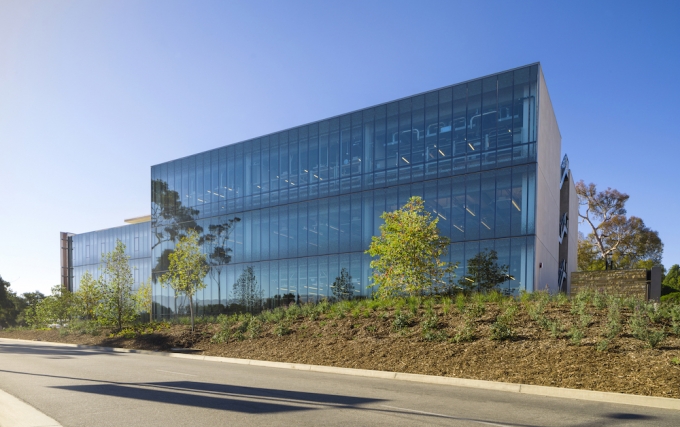UC Santa Barbara’s Institute for Energy Efficiency (IEE) and Facebook are announcing a new partnership that will accelerate research into energy-efficient data centers and artificial intelligence (AI). Facebook, a leader in developing, building, and operating highly reliable and efficient data centers, will provide a three-year, $1.5 million grant in support of the institute’s pioneering research.
Through this partnership, IEE will investigate advanced energy-efficient data center infrastructure including low-power optical interconnects for compute networks and machine learning (ML) with reduced carbon footprint. Committed to 100% renewable energy since 2018, Facebook has long believed that the first step is always to use the least amount of energy possible by building and operating the most energy efficient data centers in the industry. Facebook has committed to reaching net zero emissions across its value chain in 2030.
”We are deeply grateful to Facebook for their generosity and support of the university and the Institute for Energy Efficiency,” said Rod Alferness, dean of the College of Engineering. “This gift will drive collaborative discoveries of potentially world-changing solutions to substantially reduce the energy required to drive vital next-generation data centers and applications of machine learning.”
“For more than 10 years, Facebook has been focused on designing, building and operating some of the most efficient data center facilities in the world. We are thrilled that our research team will partner with UCSB’s Institute for Energy Efficiency to help drive innovation,” said Rachel Peterson, VP of Data Center Strategy at Facebook. “We look forward to working together to bring energy efficiency to the next level.”
Facebook will also help develop research projects and provide IEE researchers with insight from their prior experiences designing and operating data centers. The tech leader currently has eight operational data center sites in the US, with five more sites that have been announced but not yet begun operating.
“Facebook is a world leader in data center efficiency, and we are happy to partner with them to further deliver the next generation of technologies to deliver efficiency gains,” said IEE Director John Bowers, a distinguished professor of materials and electrical and computer engineering. “They will provide us with the problems that need to be addressed, and we will work together to solve them.”
“We are excited to launch this research collaboration with IEE,” said Katharine Schmidtke, Facebook’s director of sourcing and research lead for the UCSB IEE partnership. “We hope our contribution will help foster research in data center energy efficiency to transform technology in computing and communications and to drive efficiency in key workloads such as AI/ML training and inference.”
Improving Efficiencies for Data Centers, Artificial Intelligence and Machine Learning
With the partnership powering its research endeavors, IEE expects to make significant headway on two of its grand challenges: achieving multiple orders-of-magnitude improvement in the efficiency of both data center and AI/ML workloads.
In recent years data centers have made significant strides in energy efficiency, but there is still an urgent need for new technologies to offset the continued growth in demand driven by new workloads such as ML, AI, and video. Historically, Moore’s Law correctly predicted the ability to offset increasing computing demands with advances in semiconductor process technology, enabling data centers to scale in a manageable environmental footprint. However, in recent years process technology advancements have slowed as fundamental physical limits are approached. To address this challenge, IEE researchers are pursuing a multi-faceted strategy, targeting efficiency improvements in multiple areas. Computer science professor Tim Sherwood and other faculty are developing new hardware and architecture to not only improve the inherent efficiency of servers and processes, but also reduce power used for cooling. Improvement in algorithmic efficiency is also anticipated to yield significant reductions in the data center power footprint associated with AI and ML applications, and this work is being pursued by researchers such as William Wang. The institute’s world class photonics faculty, which includes Bowers, are focused on unlocking the next wave of efficiency breakthroughs associated with interconnects; the essential technologies which provide high bandwidth connections between the compute nodes as well as to users.
“IEE is a world leader in silicon photonics, which is enabling higher capacity electronics through co-packaging of electronics and photonics. This research is essential to develop the next generation of high-capacity switching chips and becomes even more important for future generations of electronics,” said Bowers, an internationally renowned authority on silicon photonics and optoelectronics.
“A gift of this scale is very rare and definitely transformative,” said Wang, the Mellichamp Chair of Artificial Intelligence and Designs. “Last summer, we collaborated with the Facebook AI Group to build an inference engine for Natural Language Processing that achieved ten times more energy efficiency than the current model. It further demonstrates the importance and potential impact of working with industrial partners to understand real-world problems and connect scientific research and engineering.”
In recognition of Facebook’s gift, the university will name one of the experimental data center laboratories in Henley Hall the “Facebook Data Center Energy Efficiency Lab.” A dedication and recognition ceremony will be scheduled at a later date, once state and county public health restrictions related to the coronavirus are lifted.

Henley Hall, home to the Institute for Energy Efficiency
